Login or Subscribe
You must be logged in to access this content
Subscribe for free access to Japanese Exotic Mushroom Journal and gain insider knowledge on effective cultivation methods for Japanese mushroom species. Elevate your skills with expert tips and innovative technologies to master the art of growing Japanese exotic mushrooms.
◆ Discover exclusive Japanese mushroom cultivation techniques
◆ Learn innovative methods to enhance mushroom quality and yield
◆ Tap into Japan's rich heritage for unique growing insights
◆ Discover exclusive Japanese mushroom cultivation techniques
◆ Learn innovative methods to enhance mushroom quality and yield
◆ Tap into Japan's rich heritage for unique growing insights
Subscribe Now for Free Login
From Forest to Feast:
Unveiling the Profound Legacy of Human-Mushroom Relations
When talking about the bounty of forests, mushrooms cannot be left out. For thousands of years people have enjoyed mushrooms in their various forms through the forests of the world. Fungi have played an essential role in the forest ecosystems through the history of Earth. The fruiting bodies we call mushrooms are just one part of a complex organism, but they have become an important and well-loved food source around the world. Japan in particular is known for its exceptional fondness for mushrooms.The goal of my column this time is to explore the history and the cultural diversity of mushrooms for readers.Single-celled organisms are said to have been the first living organisms to appear on this planet. From these shared origins, fungi have evolved along a different and highly unique path from both plants and animals, and along the way have played an immeasurable role in the development of life on earth. The earth 4.6 billion years ago was a merciless environment devoid of even oxygen. From the oceans the first single-cellular organisms were born and life on earth began. These primitive microorganisms, known as LUCA (Last Universal Common Ancestor), are considered the common ancestor of all life.Bacterium continued to evolve, until roughly 2.1 billion years ago the first eukaryotes appeared. Eukaryotes evolved in many different directions, splitting into the animal and plant kingdoms, but fungi also carved out for themselves an important, separate role in this ecosystem. Fungi decompose the corpses of animals and dead vegetative matter which enables the circulation of nutrients and maintains the ecological balance of the world.In any case, there is no doubt that the existence of fungi has been essential to the persistence of life and its continued evolution on Earth. Today, of course, the abundant ecosystems across the globe, as well as us humans, continue to be born, evolve and change, thanks to the indispensable power of fungi.The connection between mushrooms and people exhibits a deeper relationship beyond just a simple questions of food chains. According to some of our oldest historical records, mushrooms have been an important foodstuff, medicine, and even religious object in divergent ancient civilizations around the world. For example, archaeology has found evidence in ancient ruins in Chile dating back 13,000 years that show mushrooms as a prehistorical food source. Elsewhere, in ancient Egypt mushrooms were a sacred symbol of immortality, and records indicate that the Pharoahs retained special rights to mushrooms as a tribute.
In ancient Greece, mushrooms were considered “the food of the gods,” and many philosophers and doctors wrote of their medicinal properties. Natural philosophers of the Roman Empire, such as Pliny the Elder and Dioscorides, also offered intricate classifications for different mushrooms as well as descriptions of their various medicinal usages. As such, mushrooms are a shared part of human culture from ancient times, influencing human lifestyles, health, nutrition, and even spiritual practices.- Japan’s “Mushroom Culture” begins in the Jomon Period (14,000~ 300 B.C.E.)In Japan, numerous archaeological sites from the late Jomon Period starting around 2000 years before the Common Era have unearthed mushroom-shaped pottery that clearly suggest that the people of Japan have been using mushrooms since at least that point in time. Jomon Period archaeological sites with various mushroom shaped goods attest to ancient people’s interest in mushrooms. These relics may have potentially been tools for distinguishing poisonous and edible mushrooms, or possibly been used as a symbol of abundant harvests. Japan’s “mushroom culture” reflects an ethos of coexistence with nature which is also reflected in the importance of mushrooms like matsutake and shiitake in Japanese cuisine even today.The facts of history showcase just how deep the history between mushrooms and human culture, medicine, and religion is. As such, mushrooms aren’t just a simple food, they have played a major role in human life; and many would consider them to be a treasure of the natural world.
Natural forest mushrooms have a mystical beauty, a unique flavor, and an abundance of different beneficial nutraceutical compounds, which have charmed people around the world. Here I will list some examples of the various wild mushrooms of the forests of the world that numerous peoples and cultures have long-valued. 
- 1. Matsutake (Tricholoma matsutake)Matsutake, with its characteristic fragrance is one of the more well-known premium mushrooms, especially in Japan where it is highly regarded. Many Japanese people still go hunting for matsutake in the mountains and foothills during the autumn, and the mushroom has great significance to Japanese cuisine, in which its unique flavor is the focus of many traditional autumn dishes. Matsutake are rare and have not been artificially cultivated, which has made them an important and expensive gift item as well.2. Truffle (Tuber spp.)Truffles are a luxury mushroom that grow within the soil. The flavor and aroma of are prized in France and Italy in particular. Among truffle species, the white truffle and black truffle are the most famous, with their intense fragrance and smell, and are often used in high-end cuisine. Specialized dogs or pigs are used in truffle hunting in a particularly unique harvesting process.3. Shiitake (Lentinula edodes)Shiitake are, starting with Japan, an indispensable mushroom in Asian cuisines. Japan, China, South Korea and other countries in the region widely cultivate shiitake for its thick, meaty texture and the deep umami flavor it adds to dishes. Shiitake have been found to stimulate the immune system and have garnered a great deal of attention as a health food as well.4. Porcini (Boletus edulis)Equally indispensable to Italian cuisine are porcini mushrooms. The thick, weighty fruiting bodies and rich, nutty flavor are characteristic of this species. Used either fresh or dried, porcini are a key ingredient in risotto, pastas and are even used in soup stocks. Porcini are widely found throughout the forests of Europe, making them a common target for mushroom foragers there.5. Chaga (Inonotus obliquus)Chaga is found in northern Europe, Russia and the colder regions of North America in birch forests. With a long history of use in traditional medicine, research has shown this musurhoom to have antioxidant as well as immunomodulating effects. Recently, chaga has come into wide use in herbal supplements and extracts, and processed into many health foods and nutritional products.6. Morel (Morchella esculenta)
Morels are native to the forests of North America and Europe, and are harvested during the spring. They are known for their distinctive netlike shape and highly-regarded nutty richness. Morels are used in both dry and fresh form. Morel hunting season is an especially popular time of year for fans of mushroom foraging.All of these mushrooms possess their own unique appeal and have contributed to the food cultures of many different countries. In addition, research into these mushrooms as functional foods is ongoing, and the full extent of their contributions to health may still be hidden. Wild mushrooms are a natural bounty of forest ecosystems that contribute to human health and gourmet cuisine.By the same token, all of these relations between food culture and mushrooms are part of a diverse web of human cultures heavily influenced by the diverse natural environments on earth. Mushrooms, with their bountiful flavors, unique textures, and high nutritional content are a handy ingredient in cuisines around the world. Moreover, as the aforementioned research into mushrooms as a functional food progresses, we are seeing a boom in interest in mushrooms as they are reevaluated for both their role in regional food cultures and maintaining human health. 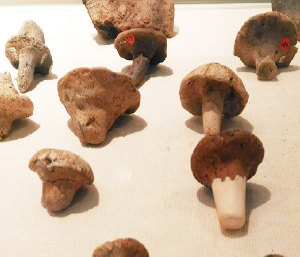
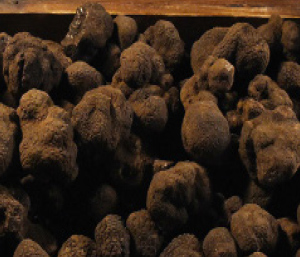
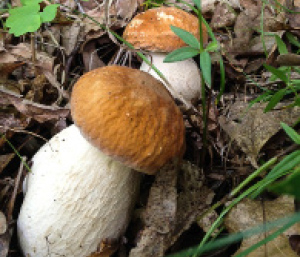
- The Background of Japan’s Unique Mushroom CultureWithin Japanese culture, and especially its food culture, there are two particular mushrooms that have had a central role. Those mushrooms are matsutake and shiitake. The two have come to symbolize the taste of autumn cuisine and have burrowed their mycelium deeply into the culture of Japan, each with their own unique appeal and history.Matsutake, with its unique aroma that is much beloved in Japan, stands as one of the most symbolic foods of the autumn season. Starting in the Heian Period (794-1185) matsutake foraging became a favorite pastime of the nobility, and classical literature like the Man’yoshu uses matsutake as a poetic theme, showing the love ancient Japanese people held for the mushroom. That value remains unchanged even today, and matsutake continue to adorn dining tables across Japan. Matsutake has always been used not just for its nutritional value, but for its rich and full-bodied flavor, which has enhanced the delicate and simple taste of Japanese cooking since ancient times.Although we do not know exactly when the Japanese first began to eat shiitake, techniques for food drying as a preservative method had arrived in Japan in conjunction with Chinese food culture at the 9th Century at least. Historians believe that from that point on dried shiitake would have been a commonly used commodity in food. During this same time period, Chinese records indicate occasional exports of dried shiitake in the rare international voyages whose logs remain preserved to us. It is clear that during this period shiitake were a rare and highly prized ingredient.After this, dried shiitake start to appear in ancient cookbooks, and it was in these olden times that shiitake became one of the most emblematic luxury food items used by the nobility and upper class. The strong umami flavor of dried shiitake came to have a major impact on Japanese culinary culture, especially the heavy use of stocks called dashi in cooking. Shiitake became an indispensable ingredient in Japanese and Chinese cooking alike. Thus, the history of shiitake cultivation in Japan begins an extremely long time ago, and these traditions have continued to the present day.Mushrooms and the Food Cultures of North America and EuropeTurning our focus to North America and Europe on the other side of the world, the country that first springs to mind when thinking about mushroom food cultures is Italy. Italy shares a similar topography with Japan, being surrounded by sea and historically having ample forests.The Italian peninsula is the birthplace of many of Europe’s mushroom-eating traditions; in some cases, it is said that through Christian pilgrimages and the interplay of different nationalities in Italy, this Meditarranean country is the origin of many of Europe’s mushroom-eating cultures. At the same time, we must still acknowledge that the history between humans and mushrooms in Europe is extremely old. Mushrooms have been a source of food, medicine and religious symbolism for millennia across divergent cultures and regions within the subcontinent.Carvings of mushrooms dating back to 1800 B.C.E. have been found on France’s Mt. Bego. Elsewhere, near the border of Austria, the 5300-year-old mummified remains of Ötzi was found in the glaciers with two different varieties of mushrooms on his person. Therefore, it is a fact that mushrooms have deep roots in human societies on the European subcontinent as well.Within Europe however, I would especially like to highlight the striking role mushrooms have played in the cuisines and culinary histories of Italy and France. The history of mushrooms in Europe goes all the way back to Ancient Greece and Ancient Rome. Those cultures valued mushrooms both for their rarity and for their flavor. Particularly Rome, where mushrooms were described as “the food of the gods” and the exclusive to the elites.

- Mushrooms and Food Culture in Italy and FranceThe role of mushrooms in both Italian and French food cultures is based on deep historical traditions. Mushrooms have not been seen as just simple foodstuffs, but valued for the underlying medicinal and religious values they possess. Today, the popularity of mushroom foraging and mushroom-based dishes remains a testament to this historical legacy. Mushrooms have made the food cultures of these two countries more bountiful, and these flavors have played an important role in spreading the use of mushrooms the world over.In Italy in particular mushrooms are an indispensable ingredient for many regional specialties. Especially Northern Italy, where porcini and truffles are treasured ingredients for many risottos and pastas with a long tradition of culinary use. Truffles are renowned as a luxury ingredient, one which is emblematic of refinement in Italian cuisine. In France too, mushrooms provide additional depth and a richer flavor to dishes.Autumn in France is well-known as mushroom foraging season, when families and friends alike head to the forest to search for mushrooms. So much so that it is on the level of a seasonal festival in terms of cultural importance for France. A large number of traditional recipes (for example certain sauces, soups, quiches and more) have seasonal variations for autumn that utilize wild mushrooms picked during this period of the year.France is not the only country in world where mushroom foraging is an important cultural tradition and common pastime. Other countries also have their own unique varieties of mushrooms, and related traditional cuisines. My point is to emphasize how mushrooms play a broad role as an important food across the globe.Turning our eyes to the United States, however, we see that the interest in mushrooms is comparatively new. In recent years interest in mushrooms has taken on a culinary and health aspect, leading to an explosion of interest in fungi in the United States. There are many aspects to this boom, such as the versatility of mushrooms as an ingredient, their healthiness, and rising environmental consciousness among consumers all contributing to more widespread interest in fungi.The wide diffusion of information on the internet, and the growing availability of a number of different mushroom varieties in supermarkets and from farms, have helped stimulate the growing acceptance and use of mushrooms in the American market. Whether as a health food, or because of environmental concerns, or for the simple pleasure of eating them, mushrooms have gained value and American culture is rapidly catching up in embracing fungi.The rise in health-conscious eating has also brought greater attention to mushrooms and their antioxidant and immune-modulating properties. A variety of mushroom-based processed foods have also begun hitting markets. Many revolutionary new uses of mushrooms are being field-tested in the United States, from mushroom-infused coffees, to shiitake-based vegan beef jerkies and more, many of which have gained a dedicated following among health-conscious consumers.
Like this we can see how mushrooms continue to play a pivotal role among both human societies and ecological systems, one whose history and evolution are gradually being utilized not just as a healthy food, but to hopefully create a new food culture as a sustainable food source. - Mushroom nutrition and health functions
Edible mushrooms are known for their variety and high nutritional content. Among these many varieties, each has its own unique traits and functional compounds as well as health effects. Here, I would like to take a moment to briefly summarize some of the health benefits studies have found in a number of the most common edible fungi, and go over what makes them healthy.
1. Shiitake (Lentinula edodes)
Active functional compounds: Lentinan, eritadenine, vitamin D, beta-glucans
Potential Health Benefits: Strengthening the immune system, improving cholesterol levels, reduction of cancer risks
2. Maitake (Grifola frondosa)
Active Functional Compounds: beta-glucans, ergosterol (as a precursor to Vitamin D2)
Potential Health Benefits: blood sugar regulation, immunostimulation, anti-cancer properties
3. Reishi (Ganoderma lucidum)
Active Functional Compounds: triterpenoids, fungal polysaccharides (including beta-glucans)
Potential Health Benefits: stress relief, immunomodulation, promotion of cardiovascular health
4. Enoki (Flammulina velutipes)
Active Functional Compounds: beta-glucans, trehalose
Potential Health Benefits: strengthening the immune system, anti-cancer properties, blood sugar stabilization
5. Oyster mushrooms (Pleurotus ostreatus)
Active Functional Compounds: beta-glucans, ergothioneine
Potential Health Benefits: cholesterol-lowering, anti-cancer properties, anti-inflammatory properties
6. Almond agaricus (Agaricus blazei)
Active Functional Compounds: beta-glucans, ergosterol
Potential Health Benefits: immunostimulation, anti-cancerial properties, blood sugar regulation,
7. Wood ear mushroom (Auricularia auricula-judae)
Active Functional Compounds: fungal polysaccharides (including beta-glucans), dietary fiberPotential Health Benefits: improved blood circulation, cholesterol-lowering, improve digestionImmune system support and the modulation of inflammatory processes associated with the immune system, along with anti-cancer properties found in a number of different studies are key points most of these mushrooms share. There have also been findings that mushrooms contain other compounds that may promote cardiovascular health, help regulate blood sugar, and have shown benefits in promoting healthy cholesterol levels.The various compounds characteristic to mushrooms have shown many benefits to human health in research and epidemiological studies, but in order to fully reap these benefits, it is important to consume mushrooms as part of a balanced and healthy diet.The latest research into mushrooms as a functional food.Beta-glucans are a class of complex polysaccharides contained within the cell walls of mushrooms, which have shown properties as an immuno-stimulant. Shiitake and maitake especially have high beta-glucan contents and regular consumption has been associated with a healthier immune system in some epidemiological studies. Beta-glucans and other immunomodulating compounds in mushrooms have been shown to help increase the body’s ability to resist infections while strengthening the immune system as a whole.Lion’s mane (Hericium erianaceus) contains compounds like hericenone and erinacine that may have protective affects against Alzheimer’s disease and other forms of dementia. A result of recent research is that mushrooms are far more than just a delicious ingredient, and have hidden potential as a functional food that can contribute directly to better health.The evolution of mushroom cultivationMushroom cultivation techniques have evolved tremendously over the past few hundred years. Where, in the beginning, humans could only search the forests for seasonal harvests of wild mushrooms, there is now a complex scientific system for the precise cultivation of many edible fungi. The latest developments in science mean that mushrooms can now be cultivated efficiently and sustainably. Through the manipulation of temperature, humidity, and lighting, it is now possible to cultivate various mushrooms year-round, and consumers can enjoy the wide availability of mushrooms all year long.Besides shiitake, other common varieties of mushroom cultivated in Japan include enoki, nameko, maitake, shimeji, eryngii. Other mushroom species still appear on the market on occasion according to consumer needs or regional demand. Mushrooms have attracted a great deal of attention as a nutritious ingredient that brings a unique flavor and texture to cooking.The sustainability of mushroomsIn recent years, mushrooms have grown into a sustainable food source, and the use of mushrooms as a nutritious component in processed foods is continuing to grow. As a key component of circular agriculture, mushroom cultivation has the ability to reduce the environmental burden of human agriculture and make practical use of existing resources. In keeping with the turn towards health-oriented consumption, the development of mushroom-based food products and drinks continues unabated, and mushrooms will help tap into new potentials in food in the future. - The Future of FungiAs this column progresses, it becomes clear that mushrooms are more than just a food ingredient. From the dawn of the Earth to the present day, mushrooms have influenced human food culture, health, and even the spiritual realm. Throughout this long history, humans and mushrooms have influenced each other and evolved together. From ancient beliefs to modern scientific research, the infinite possibilities of mushrooms continue to fascinate us.The mushroom cultures that have been nurtured around the world tell the unique history of each region’s nature and people’s wisdom. Matsutake and Shiitake in Japan, truffles in France and Italy, each beloved mushroom reflects the deep relationship with the natural environment of its land, enriching the local food culture.Among these, the regional mushroom cultures represented by Matsutake in Japan and truffles in Italy are precious cultural heritages cultivated by the unique nature and history of their regions. The distinctive flavors, textures, and nutritional differences of various mushrooms have become important elements that enrich and deepen food culture.Through mushrooms, people feel a connection with nature and enjoy the changing seasons. As research on the nutritional value and health benefits of mushrooms progresses, it has become clear that mushrooms have value beyond mere food ingredients. This signifies that mushrooms will continue to expand their value worldwide as a sustainable food source and a vital component supporting our health.Mushrooms also function as part of the microorganisms supporting forest regeneration and soil health. The sustainable use of mushrooms is an important step towards consideration for the global environment and the future of humanity. Innovations in mushroom cultivation not only expand the possibilities of mushrooms as food resources but also contribute to reducing environmental impacts. Thus, mushrooms may provide solutions to many of the challenges we face.As discussed, mushroom food cultures vary greatly by region and civilization, influenced by each region’s relationship with nature, food culture, and social structure. In Japan, a culture emphasizing coexistence with nature took root in the Jomon period, while in Europe and China, societies and cultures developed around agriculture and animal husbandry.In the next issue, we will focus on how the cultures of the Jomon period in Japan, and the agriculture-centric cultures of Europe and China, have influenced the use of mushrooms and food culture.
By exploring the deep connection between mushrooms and humans that has continued since ancient times, and how it is reflected in today’s mushroom culture, we may find a better way to coexist with nature. Mushrooms will continue to be an indispensable part of our lives. With gratitude for their diverse and infinite benefits, including their nutritional value, flavor, and functionality, we aim to further deepen our knowledge and understanding of mushrooms to build a sustainable future together.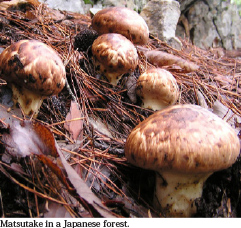

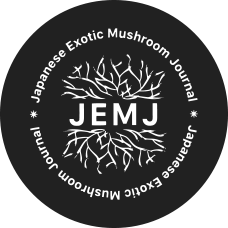



 1-2-13 Honmachi, Komoro city, Nagano prefecture, Japan 384-0026
1-2-13 Honmachi, Komoro city, Nagano prefecture, Japan 384-0026